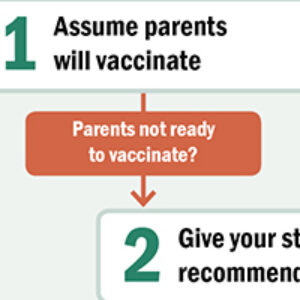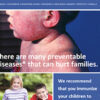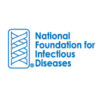
Resources & Strategies for Communicating with Vaccine Hesitant Families
In these divided times, it’s important to recognize and remember that all parents want to do what is best for their child. While each family is different and not all methods of communicating will work for every parent or healthcare provider, important communication strategies exist to reassure families of vaccine safety.
Assume parents will vaccinate.
When discussing vaccines for children, it is best to remember most parents are planning to vaccinate. Introduce the topic with that in mind. State the child will receive vaccines as though you presume that parents want vaccines for their child during that visit.
A research study looking at healthcare professionals and parents’ interactions during vaccine visits showed parents were more likely to express concerns when providers used language that asked parents about their vaccination plans. In this study, the presumptive approach resulted in significantly more parents accepting vaccines for their child, especially at first-time visits. However, if parents still hesitate or express concerns, move to the next step and give your strong recommendation.
Give your strong recommendation.
Although parents frequently consult family members, friends, and websites for information on vaccines, parents consistently rank their child’s doctor as their most trusted source for vaccine information. With this unique position, your strong recommendation is critical for vaccine acceptance.
Clearly state your strong recommendation. If appropriate, you can add a brief supporting statement that uses a mix of science and anecdote, depending on what you think will be most effective with that parent. Share the importance of vaccines to protect children from potentially life-threatening diseases or talk about your personal experiences with vaccination.
Listen to and respond to parents' questions.
Seek to understand parents’ concerns and provide requested information. Although research shows most parents in the United States support vaccines, you will encounter parents with questions. If a parent has concerns, resists following the recommended vaccine schedule, or questions your strong recommendation, this does not necessarily mean they will not accept vaccines. Sometimes parents simply want your answers to their questions. Your willingness to listen to their concerns will play a major role in building trust in you and your recommendation.
When listening, seek to understand the concerns behind parents’ questions before responding with information the parent may not be asking about. If you encounter questions you do not know the answer to or information from sources you are unfamiliar with, it is best to acknowledge the parent’s concerns and share what you do know. Offer to review the information they have found and, if necessary, schedule another appointment to discuss it further.
Strategies for parents who decline vaccination.
If parents decline immunizations after your strong recommendation and conversation, use the following strategies:
- Continue the conversation about vaccines during the next visit and restate your strong recommendation.
- Inform parents about clinical presentations of vaccine-preventable diseases, including early symptoms.
- Remind parents to call before bringing their child into the office, clinic or emergency department when the child is ill, so healthcare professionals can take precautions to protect others. Explain that, when scheduling an office visit for an ill child who has not received vaccines, you will need to take all possible precautions to prevent contact with other patients, especially those too young to be fully vaccinated and those who have weakened immune systems.
- Share If You Choose Not to Vaccinate Your Child, Understand the Risks and Responsibilities with parents. This fact sheet explains the risks involved with their decision, including risks to other members of their community, and additional precautionary responsibilities for parents.
You may wish to have parents sign the American Academy of Pediatrics Refusal to Vaccinate form each time a vaccine is refused so that you have a record of their refusal in their child’s medical file.
Success Comes in Many Forms
Remember, success comes in many forms. It may mean that parents accept all vaccines when you recommend them, or that they schedule some vaccines for another day. For very vaccine-hesitant parents, success may simply mean agreeing to leave the door open for future conversations. Work with parents to agree on at least one action, such as scheduling another appointment or encouraging the parent to read additional information you provide them. If a parent declines vaccine once, it does not guarantee they always will. Continue to remind parents about the importance of keeping their child up-to-date on vaccines during future visits and work with them to get their child caught up if they fall behind.
Content from CDC Provider Resources for Vaccine Conversations with Parents.
Additional Resources
- CDC Preparing for Questions Parents May Ask About Vaccines
- CDC Understanding Vaccines and Vaccine Safety
- CDC Creating a Culture of Immunization Within Your Practice
- American Academy of Pediatrics Communicating with Vaccine Hesitant Parents
- American Academy of Pediatrics Immunization Information for Parents
- American Academy of Family Physicians Strategies for Addressing and Overcoming Vaccine Hesitancy
- American Academy of Family Physicians Vaccine Adverse Events: Separating Myth from Reality
- Immunity Community WA E-course There Never Was an Age of Reason: Vaccines, Vaccine Hesitancy, and Vaccine Decision Making
- Children’s Hospital of Philadelphia Vaccine Education Center
- Children’s Hospital of Philadelphia Logical Fallacies and Vaccines: What You Should Know



